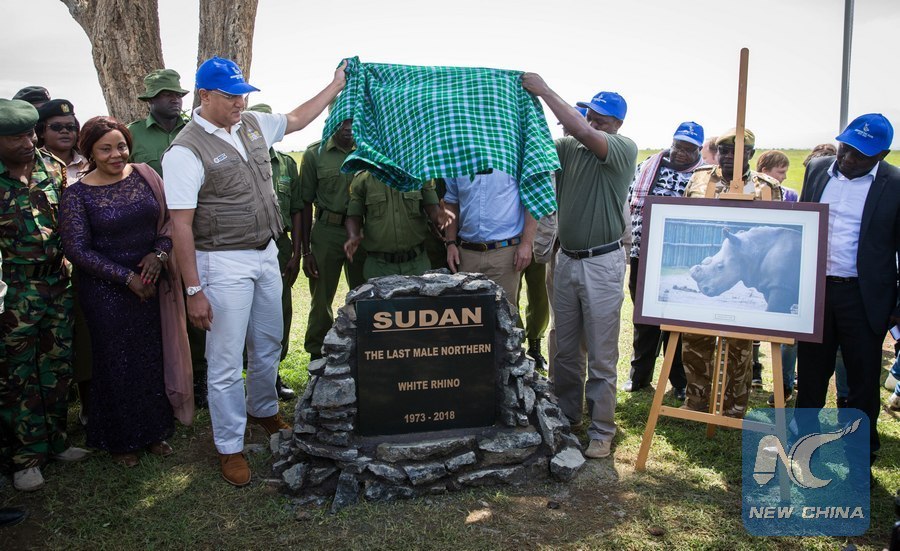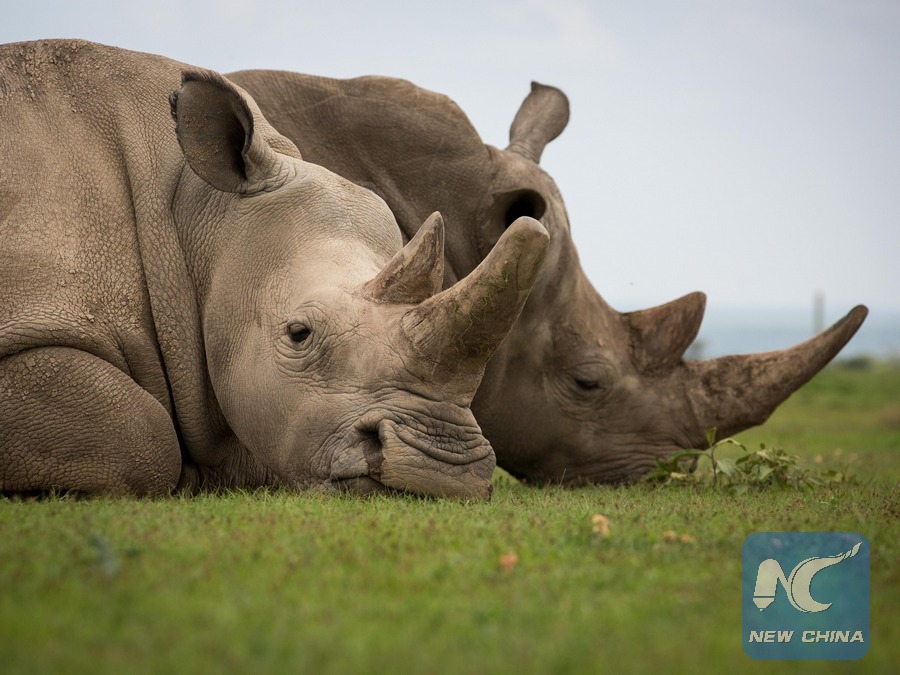
Kenyan Cabinet Secretary for Tourism and Wildlife Najib Balala (3rd L, front) unveils the tombstone of Sudan, the late world's only remaining male northern white rhino, in Ol Pejeta Conservancy in Laikipia county, northern Kenya, March 31, 2018. Kenyan wildlife officials and global wildlife conservationists on Saturday converged at Ol Pejeta Conservancy in northern Kenya where a memorial service for the late world's only remaining male northern white rhino fondly named Sudan took place. (Xinhua/Lyu Shuai)
LAIKIPIA, Kenya, May 11 (Xinhua) -- Kenya will fast-track laws to make wildlife poaching a capital offense as part of the country's bid to conserve flora and fauna, a senior government official said late Thursday.
Najib Balala, the Minister for Tourism and Wildlife, said that once the laws are enacted, the offenders of the wildlife crimes will face the death penalty in accordance with the laws of the land.
"We have in place the Wildlife Conservation Act that was enacted in 2013 and which fetches offenders a life sentence or a fine of 200,000 U.S. dollars. However, this has not been deterrence enough to curb poaching, hence the proposed stiffer sentence," Balala remarked during the official launch of the northern white rhino commemorative stamps at Ol Pejeta Conservancy located in Laikipia County on the slopes of Mount Kenya.
The initiative to issue a set of stamps to celebrate the northern white rhino was instigated by the Postal Corporation of Kenya in honor of "Sudan", the remaining male northern white rhino that died on March 19 after suffering from age-related health issues and from a series of infections.
Richard Vigne, the CEO of Ol Pejeta Conservancy that was home to Sudan, said the tragic story of the northern rhino will be captured forever as a signal to the world. He added that whilst Kenya remains a global leader in conservation, there are nonetheless many species across the planet that face a similar plight.
Vigne said that once Sudan's condition worsened significantly and he was unable to stand up, and obviously suffered a great deal, the decision to euthanize the mammoth was made by his veterinary team. This left Najin and Fatu as the two remaining northern white rhinos on the planet.

Photo taken on March 30, 2018 shows Fatu (L), one of the world's last two remaining female northern white rhinos, in Ol Pejeta Conservancy in Laikipia county, northern Kenya. Kenyan wildlife officials and global wildlife conservationists on Saturday converged at Ol Pejeta Conservancy in northern Kenya where a memorial service for the late world's only remaining male northern white rhino fondly named Sudan took place. (Xinhua/Lyu Shuai)
"Despite the extremely low numbers remaining, Ol Pejeta and Kenya Wildlife Service are working closely with the scientific community to try to recover this species from imminent extinction," Vigne noted, adding that the only way this can be done is through in vitro fertilization (IVF).
The conservationist said that because scientific practice has never ever been done in rhinos before, it will require the removal of eggs from the ovaries of the two remaining females to be fertilized using semen stored from males over the last few years to create viable mature embryos for storage in liquid nitrogen.
Once this has been achieved, a technique to reintroduce the embryos into surrogate southern female, because the two are infertile, with the aim of achieving pure bred northern white pregnancies.
"This effort will cost a huge amount of money, but is a noble effort to reverse at least one of the wrongs that mankind has wreaked upon other species that inhabit this planet with us," Vigne stated.
Patrick Omondi, the Director of Research in the Ministry of Tourism and Wildlife, said plans were underway to build a wildlife conservation museum that will feature wildlife icons, adding that the remains of Sudan will be displayed in a national conservation museum.

